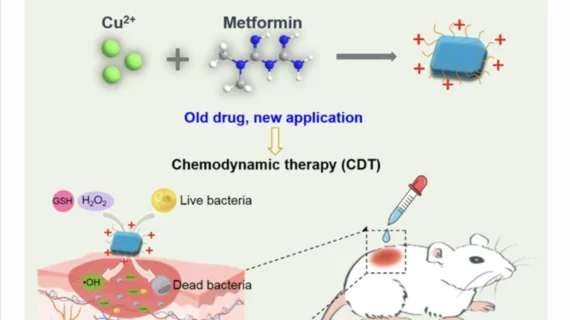A new use for metformin? Popular type 2 diabetes medication may also improve cancer and infection therapies
Doctors have been prescribing metformin to treat type 2 diabetes for decades, and some recent studies have suggested it may also boost heart failure outcomes.
A research team out of China thinks it may have discovered yet another use for metformin: improving the speed and effectiveness of antibacterial treatments for cancer and a variety of infectious diseases. The group shared its findings in Nano Research.[1]
Chemodynamic therapy (CDT), researchers explained, has gained momentum in recent years as a potential treatment for cancer, bacterial infections and infectious diseases. CDT was developed to weaken diseased or infected cells, making other treatments more effective.
“Bacterial resistance poses a fatal threat to human health,” co-corresponding author Linlin Li, PhD, a professor at the Beijing Institute of Nanoenergy and Nanosystems, part of the Chinese Academy of Sciences, said in a prepared statement. “Non-antibiotic antibacterial technologies and antibacterial nanoagents with specific catalytic activities not only produce toxic substrates to directly kill bacteria — including antibiotic-resistant bacteria — but can also reduce the risk of the bacteria developing resistance to drugs.”
The group identified certain traits in metformin that could, in theory, help CDT make a bigger impact.
“Metformin is a positively charged small molecule drug with reported anticancer, immunomodulatory and antibacterial effects,” Li explained. “We speculated that the integration of metformin with a CDT nanoagent would improve the antibacterial effect.”
Using mice models, the team did note that metformin effectively improved the speed and effectiveness of CDT. They even noted that the medication could potentially boost care for patients with skin wounds.
“This study provides a new pathway for improving efficiency of CDT nanoagents through using old drugs,” the authors wrote in their analysis.
Related Metformin Content:
FDA announces a new recall for extended-release metformin due to contamination
Taking metformin for type 2 diabetes does not increase a patient’s COVID-19 risk
Metformin boosts survival for female COVID-19 patients with obesity, type 2 diabetes
Reference:

